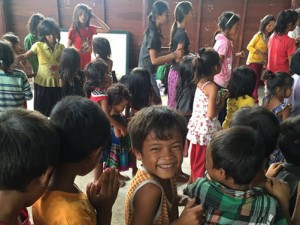Siem Reap, KH – UK and Cambodian school children enjoy time together – 29 Aug 2015
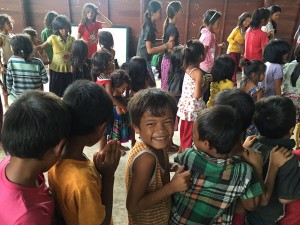 Students from Parmiter’s School, UK made their first trip to Peaksneng village, Cambodia this July. The group of fifteen secondary school students, two teachers and their wilderness guide spent six days collaborating with the local garden shop team, school children and the local community.
Students from Parmiter’s School, UK made their first trip to Peaksneng village, Cambodia this July. The group of fifteen secondary school students, two teachers and their wilderness guide spent six days collaborating with the local garden shop team, school children and the local community.
They contributed both funds and their labor to community projects that included building three Food Always In The Home (FAITH) organic vegetable gardens with families, making compost for maintaining the gardens’ soil, building a cow shed for a livestock income generation program, and helping with a local food program.
The students’ visit started in the busy capital city of Phnom Penh, where they visited many historical and cultural sites including some that were shocking reminders of Pol Pot’s Khmer Rouge regime (1975–1979). They then traveled west to the Cardamon Mountains where they hiked through the wilderness of one of Cambodia’s most secluded areas. Their next destination was Siem Reap, which is near the largest religious monument in the world called Angkor Wat.
In Seam Reap, they met up with Rey Diez who is the manager of Peaksneng Thormacheat garden shop . Rey shared with them his background and introduced the mission and objectives of his shop, as well as his objectives for the time he and the students would spend together.
 The next day the students started their journey to Peaksneng, a community 35km north of Siem Reap. They boarded the shop’s pickup truck and took the road that passes through the Temples of Angkor. The journey took them past bright green rice fields, brown rivers, thick jungle and the world renowned temples of Angkor Wat and The Bayon.
The next day the students started their journey to Peaksneng, a community 35km north of Siem Reap. They boarded the shop’s pickup truck and took the road that passes through the Temples of Angkor. The journey took them past bright green rice fields, brown rivers, thick jungle and the world renowned temples of Angkor Wat and The Bayon.
Once they arrived in Peaksneng Village they started planning their project work for the week. They divided themselves into three groups to build organic vegetable gardens, compost piles and a cow shed. The heat in Cambodia can be staggering, so that first day the students worked on the projects in the morning and went to the nearby Catholic Church in the afternoon to help prepare rice porridge for disadvantaged children in the area. After the porridge was served the students enjoyed playing games and singing songs with the children, which was the highlight of the trip for some.
Over the following days, the students adapted to the heat and worked full days in small groups. They started three vegetable gardens, working side by side with local families. The students enjoyed learning about the design and building of the gardens, which provide families with nutritious vegetables throughout the year.
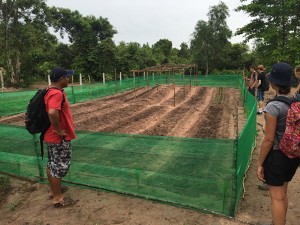 The students also participated in making compost, which is a vital part to any organic garden or farm because it replenishes nutrients in the soil that nourish the plants. They helped the team chop green and dry brown grasses and leaves, load and unload manure, layer the ingredients to make a pile of compost, and turn the compost pile. Using effective microorganisms (EM), a compost pile can be ready for use in six to eight weeks.
The students also participated in making compost, which is a vital part to any organic garden or farm because it replenishes nutrients in the soil that nourish the plants. They helped the team chop green and dry brown grasses and leaves, load and unload manure, layer the ingredients to make a pile of compost, and turn the compost pile. Using effective microorganisms (EM), a compost pile can be ready for use in six to eight weeks.
The students donated funds and labor to build a cow shed, which was the first step in establishing a livestock exchange program in Peaksneng. The program will be a way to give poor families the opportunity to raise livestock for income. Peaksneng Thormacheat shop will qualify a family based on their track record of supporting their children’s education and growing vegetables in their FAITH garden. The shop will then help the family design a low cost cow shed of their own.
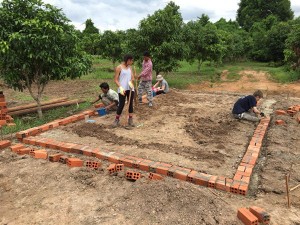 Once the cow shed is built, the shop then “lends” a female cow for the family to care for. The family feeds the cow and arranges for it to be vaccinated and become pregnant. The family gives the first and third born calves to the shop so that the shop can give cows to other families.
Once the cow shed is built, the shop then “lends” a female cow for the family to care for. The family feeds the cow and arranges for it to be vaccinated and become pregnant. The family gives the first and third born calves to the shop so that the shop can give cows to other families.
The second calf belongs to the family and, after the third calf goes to the shop, the mother cow and all future calves also belong to the family. Over the course of approximately four years, a family can accumulate three cows with a total value of roughly US$ 2,000. The family wealth can continue to grow because a healthy two year old cow can be expected to give birth once a year for ten to fifteen years!
The local shop team were impressed with the student’s work ethic while toiling in the high temperatures. The students were able to accomplish all the objectives that Rey set them, and more! For example, Rey spoke with the head teacher of a nearby school and discovered that some classrooms badly needed painting. The students happily painted the classrooms and had enough time afterwards to play some games with the school children.
Although project work is normally the most impactful, getting to know the local people and learning about local culture is just as important. The UK students were able to eat with Peaksneng families every night and exchange stories about one another’s families. They were even given the opportunity to learn how to cook traditional Cambodian meals, which included butchering poultry for the evening meal!
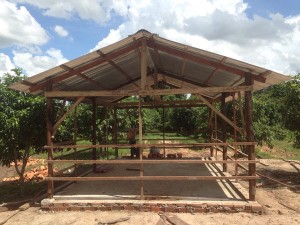 Rey the shop manager was very impressed by the students’ hard work and hopes to host more groups of eager students in the future. The people in Peaksneng were also grateful for the students’ contributions to their community and look forward to receiving more visitors. All of us at Better Lives would also like to thank the Parmiter’s School students for undertaking the long trip and for their wonderful collaboration in Peaksneng. We hope they enjoyed their many experiences!
Rey the shop manager was very impressed by the students’ hard work and hopes to host more groups of eager students in the future. The people in Peaksneng were also grateful for the students’ contributions to their community and look forward to receiving more visitors. All of us at Better Lives would also like to thank the Parmiter’s School students for undertaking the long trip and for their wonderful collaboration in Peaksneng. We hope they enjoyed their many experiences!

